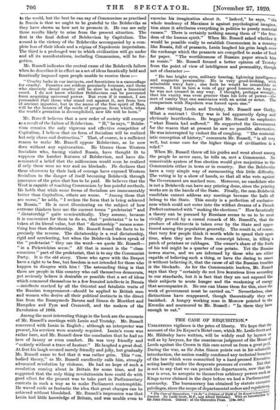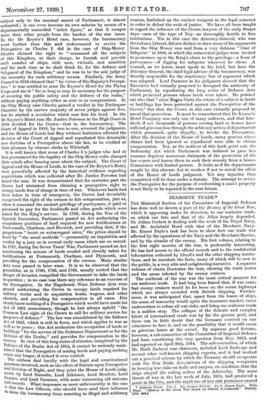THE CASE OF REQUISITION.*
UNSLEEPING vigilance is the price of liberty. We hope that the account of the Be Keyser's Hotel case, which Mr. Leslie Scott ard Mr. Idildesley have written, will be widely read by laymen well as by lawyers, for the unanimous judgment of the House of Lords against the Crown in this case saved us from a great perl During the war, as Sir John Simon points out in his admirable introduction, the nation readily condoned any technical breaches of the law which were committed by a hard-pressed Executive, acting hastily under the desperate pressure of events. But that is not to say that we can permit the departments, now that the war is over, to arrogate to themselves arbitrary powers such" Kings never claimed in the days before we had a Parliarse1ta,r1 monarchy. The bureaucracy has obtained by statute excess:co privileges, since the scope of departmental orders and regulation!! • The Case of Ravi/Mon. In lie" a Petition of Right of De KelPil,"dilli: Limited. By Ladle Scott, m.P.. and ABred Illideoley. With an Introduction Sir Cohn Simon. Oxford : at the Clarendon Pram. Luc not.] subject only to the nominal assent of Parliament, is almost unlimited ; it can even increase its own salaries by means of a departmentally controlled "index figure," so that it escapes more than other people from the burden of the war taxes. In the De Keyser's Hotel case, however, the bureaucracy went further than this and endeavoured to revive the Prerogative as Charles I. did in the case of Ship-Money Charles claimed the right to "command all the subject of this Kingdom, at their charge, to furnish and provide such number of ships, with men, victuals, and munition and for such time as he shall think fit, for the defence and safeguard of the Kingdom," and he was to be the sole judge of the necessity for such arbitrary means. Similarly, the Army Council in 1916 claimed that" by virtue of His Majesty's Preroga- tive" it was entitled to seize De Keyser's Hotel for the Flying Corps and use it " for so long as may be necessary for the purpose of securing the public safety and the defence of the realm," without paying anything either as rent or as compensation. In the Ship Money case Charles gained a verdict in the Exchequer Chamber by the narrow majority of seven judges against five, but he started a revolution which cost him his head. In the De Keyser's Hotel ease Mr. Justice Peterson in the High Court in 1918 decided for the Crown—that is, the bureaucracy. The Court of Appeal in 1919, by two to one, reversed the judgment, and the House of Lords last May without hesitation affirmed the decision of the Court of Appeal and repudiated this detestable new doctrine of a Prerogative above the law, to be wielded at their pleasure by obscure clerks in Whitehall.
It is well known that some of Charles I.'s judges who had at first pronounced for the legality of the Ship Money writs changed their minds after hearing more about the subject. The Court of Appeal and the House of Lords, in the case of De Keyser's Hotel, were powerfully affected by the historical evidence regarding requisitions which was collected after Mr. Justice Peterson had heard the case. It was demonstrated that for centuries past the Crown had abstained from claiming a prerogative right to occupy lands free of charge in time of war. Whenever lands had been taken in time of emergency, the Crown had invariably recognized the right of the owners to fair compensation, just as, when it exercised the ancient privilege of purveyance, it paid or promised to pay for the foodstuffs and other goods which were seized for the King's service. In 1708, during the War of the Spanish Succession, Parliament passed an Act authorizing the compulsory purchase of land required for new fortifications at Portsmouth, Chatham, and Harwich, and providing that, if the proprietors "insist on extravagant rates," the prices should be fixed by "the usual methods "—presumably an inquisition and verdict by a jury as in several early cases which are on record. In 1757, during the Seven Years' War, Parliament passed an Act sanctioning the seizure of lands needed and already taken for fortifications at Portsmouth, Chatham, and Plymouth, and providing for the compensation of the owners. Many similar Acts were passed in later wars. It is to be observed that the preambles, as in 1780, 1782, and 1783, usually recited that the danger of invasion compelled the Government to take the lands in question ; in no case was there any reference to an exercise of the Prerogative. In the Napoleonic Wars Defence Acts were Passed authorizing the Crown to occupy lands required for military works and to requisition boats, wagons, and other chattels, and providing for compensation in all cases. Pitt clearlyknew nothing of a Prerogative which would have made his Act of 1804 unnecessary, though he had always upheld "the Common Law right of the Crown to call for military service for Purposes of defence." The law was consolidated by the Defence Act of 1842, which is still in force, and which applies to war as well as to peace ; this Act authorizes the occupation of lands or buildings "for the service of the Ordnance Department or for the Defence of the Realm," and provides for compensation to the owners. In view of this long series of statutes, completed by the Defence of the Realm Act of 1914, it cannot be seriously main- tained that the Prerogative of seizing lands and paying nothing exists any longer, if indeed it ever existed.
The authors deal lucidly with the legal and constitutional questions involved, such as the effect of Statute upon Prerogative and Petition of Right, and they print the House of Lords judg- ments by Lord Dunedin, Lord Atkinson, Lord Moulton, Lord Sumner, and Lord Parmoor, with some interesting old statutes "nd records. What impresses us most unfavourably in the case is that the Law Officers, who should have used their influence to deter the bureaucracy from resorting to illegal and arbitrary
courses, furbished up the rustiest weapons in the legal armoury in order to defeat the ends of justice. We have all been taught to regard the influence of the Crown lawyers of the early Stuart days—men of the typo of Noy—as thoroughly hostile to free institutions. Yet in this ease the Attorney-Goneral, who was elected as a Liberal, did not disdain to draw some of his arguments from the Ship Money case and from a very dubious "Case of Saltpetre '' in 1606, in which the subservient judges were invited to pronounce upon the King's claim to the privilege—a form of purveyance—of digging for saltpetre wherever he chose. A counsel, as we know, must speak to his brief, but here the Attorney-General, the chief legal adviser of the bureaucracy, was directly responsible for the reactionary line of argument which was adopted. Lord Parmoor in his judgment showed that the Executive had virtually proposed to disregard the authority of Parliament, by repudiating the long series of Defence Acts which protected persons whose lands were taken. He pointed out also that "since Magna Carta the estate of a subject in lands or buildings has been protected against the Prerogative of the Crown," but that the Crown in this case virtually proposed to annul that protection. It must be remembered that De Keyser's Hotel Company was only one of many sufferers, and that hun- dreds if not thousands of persons owning land or houses have suffered grievous loss through the arbitrary action of departments which presumed, quite illegally, to invoke the Prerogative. After the decision of the House of Lords, many persons whose claims had been ignored or repudiated were able to obtain compensation. Yet, as the authors of this book point out, the Indemnity Act which Parliament was induced to pass last summer deprives numerous claimants of the protection of the law courts and leaves them to seek their remedy from a Losses Commission with limited powers. It looks as if the departments sought by this obscure Act to weaken if not to annul the effect of the House of Lords judgment. Yet any injustice thus committed will be done under a statute. The attempt to revive the Prerogative for the purpose of confiscating a man's property is not likely to be repeated in the near future.







































 Previous page
Previous page